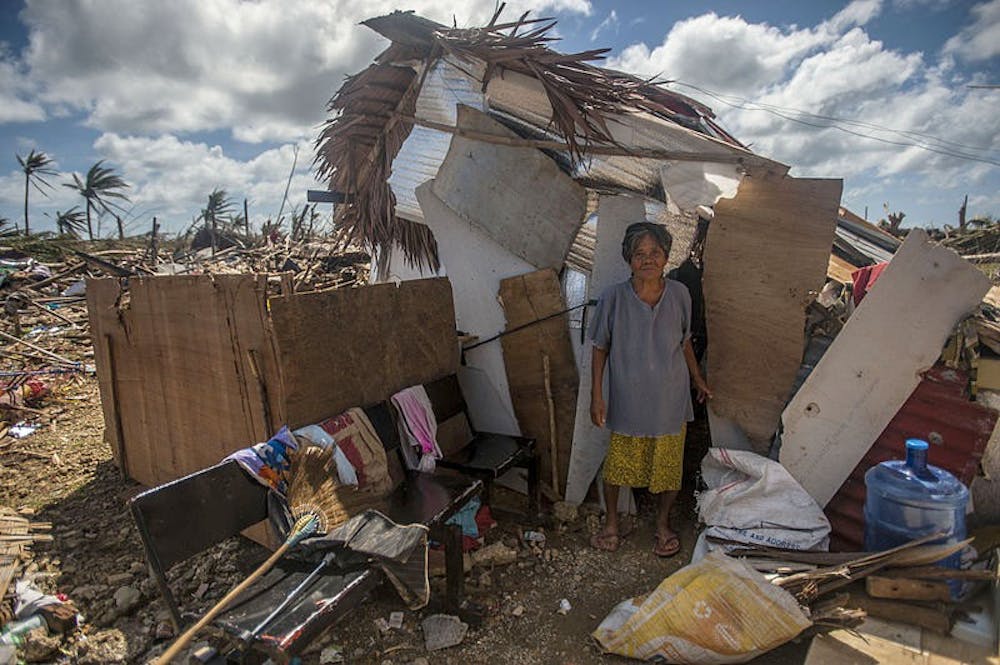Cassie Sheridan |
Five months ago, the most powerful tropical typhoon on record ravaged the coast of southeast Asia. Typhoon Haiyan claimed 5,000 lives, affected an estimated 11 million people and left the Philippines to rebuild homes and infrastructure. Since then, the world has reached out to the region sending aid, volunteers and hope. Starting Monday, the Pilots for the Philippines week of action events kick off in what has been an encapsulation of the Philippine word “Bayanihan,” meaning community of collective action. The project by the Presidential Ad Hoc committee to support the Filipino community began humbly with the desire to spark conversation on campus about the difficulties the region was facing in the aftermath of last November’s destruction by Typhoon Haiyan. The event has now expanded to include a week of diverse events involving numerous campus organizations, the larger Portland community, the Molly Hightower Day of Service and engagement of the issues from countless academic perspectives.
“One of the elements that I love is that we have utilized programs that already exist on campus,” chief organizer and professor Lauretta Frederking said. “We weren’t coming up with anything new. I see this as an opportunity annually to bring together all these programs and shine a light on a local or global issue.”
In the past, UP has responded to devastating events through raising awareness for victims. However, the leaders involved in planning for this particular week of action wanted to expand the effort to include critical conversations about the affected region’s culture and its socio-economic, political and healthcare problems in the aftermath of the typhoon.
Sophomore economics major Grace Holmes got involved in the project because of her desire to organize a larger discussion about the destruction to the region, an issue she felt few people were talking about. “Originally, I was just hoping for some students, Dr. Frederking and maybe some pizza,” said Holmes. “It’s awesome how large it has now gotten, my intention was to facilitate a dialogue and it is now going to be a dialogue engaging many academic perspectives and the larger Portland community.”
Sociology professor Valerie Francisco, who has been an integral part of the organization team, said the collaboration from so many campus organizations has been supportive of identity, on a far more personal level.
“I am Filipino, there are many students at UP that are Filipino. The typhoon was personal for many people on this campus,” said Francisco. “We wanted the conversation to be not only about victim awareness, but also about Filipino experience and identity in the wake of the tragedy.”
UP’s Filipino club, Filipino American Student Association (FASA), partnered with Pilots After Dark coordinator Eric Luke to sponsor events for Filipino support in the wake of the tragedy. The club raised around $1,500 in donations during one Pilots After Dark event and enough meal points to support the Saturday evening fundraising dinner, hosted by Bon Appetit, that will happen on March 29.
“It was surreal when we were actually able to raise that much,” senior FASA president Melody Kidd said. “The typhoon was deeply personal for everyone in the club and we were all desperate to do something, the support we received and continue to receive has been incredible.”
The week of action has also been able to involve the Molly Hightower day of service, a collaboration spearheaded by ASUP vice president junior Elvia Gaona. The Molly Hightower Service event is in honor of Molly Hightower, a 2009 UP alum who was killed during the Haiti earthquake in 2010, and occurs once a semester. This semester’s service event will involve members of ASUP and the senior class collecting medical supplies and other resources from area hospitals to send with NAFCO and other support organizations for Filipino relief.
“Our goal from the beginning has been to bring representation from different places on campus,” said Frederking. “We understood that this was an issue that we wanted to approach with our head and our hearts.”








